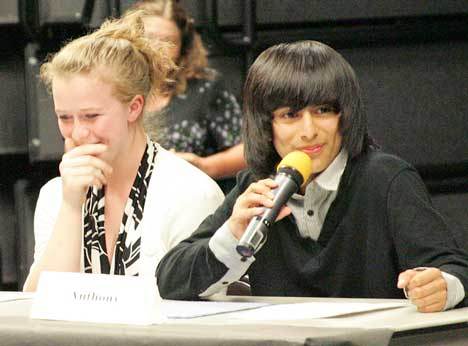The question was a tough one, but not enough to shake Brandon Anica.
The seventh grader at Mill Creek Middle School had been preparing for the Mock Congressional hearings for months, so when the judge asked about why the early American colonists thought they could get away with protests and disobeying British rule, Anica had an answer.
Well, he said, it’s kind of like if his parents grounded him and then went to Europe for a week; they’d never know. It was the same with the colonies and Britain.
The answer drew a laugh from teammates and smiles from the judges, but certainly scored highly, showing that Anica and his teammates had digested and understood the material in preparation for the final showdown June 1 in the middle school auditorium.
According to seventh-grade social studies teacher J.P. Frame, who organized the mock hearings, getting kids to think critically is part of the basic idea behind the mock congressional hearings.
“This program forces them to think about their opinion,” Frame said before the competition.
By the night of the competition, only the top teams in each of six units remained, culled down from every seventh-grader at the school, and now competing against each other to see who knew the Constitution better.
With Mayor Suzette Cooke, Councilmember Jamie Danielson and Caleb Perkins from the Office of the Superintendent of Public Instruction on hand to judge, the kids pitted their knowledge against each other, answering one scripted question and a series of follow-ups about their unit from the year’s studies of government.
Frame said beginning with Brown vs. Board of Education, the kids study the Constitution and the Bill of Rights for the year. Last year, Frame started the hearings on a smaller scale, but expanded it to include every seventh-grader at the school this year, funded partially through the Center for Cvic Education, which provided the textbooks and created the mock hearing program.
Students are scored on their understanding of the Constitution and their ability to use the documents as source material to make their arguments.
“I feel it makes them comfortable with the Constitution,” Frame said. “It’s not just a foreign document anymore.”
And in a year that began with political conventions, saw a presidential election and is concluding with a U.S. Supreme Court nomination, the kids have had plenty of real-world events to help their studies. Once the processes are explained to them, Frame said, the students get a better understanding of their world and their government.
“Almost every year my kids come up to me and say,’I understand the news now,’” Frame said, adding the teens are now able to discuss events of the day, sometimes better than adults.
“They have opinions,” he said. “It’s kind of neat to see the kids take an interest in their community.”
“It’s your government, you have the power; you have to participate,” agreed student Alex Dunmire, 13, before the hearings began.
“We’re living in this country, you should probably know stuff about it,”agreed Allyson Reaney, 13, who was part of the winning team.
The knowledge they gained through the year and displayed at the final hearing has given the students involved a new-found confidence in their ability to discuss the news and history, as they have been preparing all year to defend their ideas in front of a panel of judges.
Hannah Greene, for example, said she remembers the first week of class when Frame asked what they knew about the founding fathers and the Constitution.
“And none of us could answer,” Greene said. “I clearly remember my mind going blank.”
But that is not the case anymore, with many of the students now able to explain some of the news to their parents.
“Some of the stuff we’re learning about my parents don’t know,” said Brittany Dunlap, 13, adding the class taught her how lucky she is to be living in America and how the government works in this country.
She also said while she used to ask her father questions about the news, “Now he’s asking me.”
Jacob Llavore said as his understanding increased, he was no longer too timid to say what was on his mind.
“Now we know what rights we have,” he said. “I’m not afraid to have an opinion about government anymore.”
When all was said and done, however, it was not one of the four teams from Frame’s class that saw their names go on a permanent plaque, but the only team from Corey Bartle’s social studies class, which included Reaney, Martina Thomas, 13, Kendra Nelson, 13, Novejot Choat, 12, and Zoraida Valdovinos, 13, all of whom spoke before the competition of being the underdogs and wanting to win for their teacher.
“They did a great job,” Frame said of the winning team.
Bartle said he was a big fan of the program because of the interest it drummed up in the students, as well as the focus on understanding government.
“They can look on TV and see this is what senators do,” he said of the hearings. “That helps bring a sense of realism to it that you can’t get from reading a book.”
In the end, Frame said the scores between the five teams were within 10 points of each other.
“It was really competitive,” he said, adding that discussions are under way to conduct next year’s finale in the Council Chambers at City Hall.
“It was just a great night,” he said.
Talk to us
Please share your story tips by emailing editor@kentreporter.com.
To share your opinion for publication, submit a letter through our website https://www.kentreporter.com/submit-letter/. Include your name, address and daytime phone number. (We’ll only publish your name and hometown.) Please keep letters to 300 words or less.

